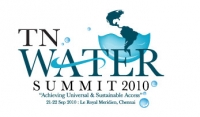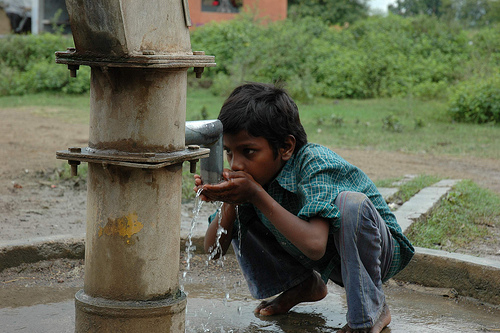Governance
Inviting public opinion on Western Ghats ecology - Ministry of Environment and Forests (Government of India)
Posted on 22 Aug, 2010 01:41 PM
How would we judge ecological sensitivity? Scientists view an ecologically sensitive area as an area whose ecological balance, once disturbed, is very hard to restore. Thus, steep Western slopes of Western Ghats, subject to heavy rains and winds, if deforested, are likely to be quickly stripped of soil cover and for ever lose their pristine vegetation. We do have a scientific understanding of the environmental attributes that render areas more sensitive; we also have insights into processes that have resulted in irreversible ecological damage.
India Water Portal is looking for Content Editors
Posted on 21 Aug, 2010 07:27 PMThe India Water Portal is an open, collaborative, web-based initiative, anchored by Arghyam, for sharing water management knowledge amongst practitioners, experts and the general public. Through its content and services, the portal aims to inspire, catalyse and support water/environment development initiatives on the ground, across the country.
TN Water Summit 2010, CII, Chennai
Posted on 21 Aug, 2010 01:03 PM
Organizer: Confederation of Indian Industry(CII)
Water, climate change and adaptation: Focus on the Ganges river basin - A working paper by Challenge Program on Water and Food
Posted on 18 Aug, 2010 11:11 PMThis working paper by the Challenge Program for Water and Food explores the intersection between water management, climate change, and adaptation in the Ganges River system, a basin vital to the security, economy, and environment of South Asia.
Recognizing that an understanding of both the science and the policy of water management, climate change, and adaptation is rapidly evolving, it is not the intention of the paper to encompass all the issues related to these broad fields, but rather to provide a starting framework from which to further develop research questions and priorities for work in water and adaptation.
Impact of climate change on water resources and glacier melt and potential adaptations for Indian agriculture - A working paper by Challenge Program on Water and Food
Posted on 17 Aug, 2010 11:24 PMThe paper by the Challenge Program on Water and Food deals with the impact of climate change on water resources & glacier melt and potential adaptations in Indian agriculture. Global climatic changes will have major effects on precipitation, water availability, glacier/ice melt, and sea level rise. Climate-induced changes in hydrological conditions will affect the magnitude, frequency, and damage costs of future extreme events.
Leh cloud-burst: A first-hand account
Posted on 16 Aug, 2010 11:44 AMMidnight, August 6, 2010: "Link, wake up! Water is coming in from the roof!" My mother and I were in Leh, Ladakh, staying at "Eco-Homestay," the house of Mr. Sonam Gyatso and family, in Lower Sankar. The house was made in a hybrid of traditional and modern construction techniques: the main hall in the house was concrete, while rooms surrounding it were made of sun-dried mud bricks, and roofed with Poplar beams, a mesh of willow branches, and a thick pad of fine clay-like mud. The house incorporated passive solar building techniques, such as a direct-gain room, and a Trombe wall, and had solar-powered lighting. It had been raining since evening, and by midnight the clay roof was saturated and began to leak.
We were in Leh for the express purpose of meeting with Helena Norberg-Hodge, the founder of the International Society for Ecology and Culture, co-founder of the International Forum on Globalization, founder of the Ladakh Ecological Development Group, and founder of the Women's Alliance, Ladakh. We had learned of her online, seeing an article of hers in CounterCurrents.org, and watching her video "Ancient Futures." She is the only person who has critically witnessed the "development" of Ladakh, from complete self-sufficiency in an exceedingly fragile eco-system, to the disaster under which it writhes today. She has seen how "development" pulls people into a money economy, increases the distance between production and consumption, brings reliance on fossil fuels (especially apparent in Leh where fuel and commodities are trucked in over a hazardous two-day journey from lower altitudes), results in urbanization and rural-urban migration, and brings psychological impoverishment to the people it is inflicted upon. For 35 years, she has been working to bring safe, stable, and ecologically sound development to the region through her organizations. Her work today, no longer limited to Ladakh, is focussed on spreading economic literacy among people throughout the planet, educating about the deeper impacts of globalization and today's consumer mono-culture. Garnered from her years of observation and research, she has an important message for humanity today, which is what prompted us to go and meet her.
Dams and development: A new framework for decision-making - A World Commission on Dams report
Posted on 15 Aug, 2010 01:51 PMThis report by the World Commission on Dams begins by arguing that the debate about dams is a much broader issue and is important for everyone since it is a debate about the very meaning, purpose and pathways for achieving development. It is complex because the issues are not confined to the design, construction and operation of dams themselves, but include a range of social, environmental and political choices that define development.
Dams fundamentally alter rivers and the use of a natural resource, frequently entailing a reallocation of benefits from local riparian users to new groups of beneficiaries at a regional or national level. At the heart of the dams debate are fundamental issues of equity, governance, justice and power. The report argues that the main challenge lies in reconciling the competing needs between different groups of actors and provides a framework to deal with these fundamental issues in the dam debate.
Increasing groundwater dependency and declining urban water quality – A comparative analysis of four South Indian cities
Posted on 15 Aug, 2010 07:18 AMThis paper by the Institute of Social and Economic Change (ISEC) examines the extent of groundwater dependency and quality status in four South Indian cities viz., Hubli, Dharwad, Belgaum and Kolar cities. Widespread water shortage problems have resulted in increased dependency on groundwater with tapping the resources to unsustainable levels. In Karnataka, out of 208 urban local bodies that come under Karnataka Urban Water Supply and Drainage Board, 41 depend on groundwater.
UN General Assembly s resolution on water and sanitation as a human right
Posted on 13 Aug, 2010 05:00 PMThe recent UN General Assembly Resolution on declaring water and sanitation as human right is or can be a powerful impetus to securing universal access to water and sanitation for people everywhere. This is the most recent in a string of initiatives to advance the provision of these essential services. Beginning with the UN Decade of Water in the eighties, then the declaration of the Millennium Development Goals, and later the adoption of General Statement 15 by the Economic and Social Council of the United Nations in 2002 the recognition of the fundamental importance of water (and more recently sanitation) to life, health and well being has been accepted at the international level. In India, while there is no specific mention of the right to water in the Constitution, the Supreme Court in its judgement(s)has upheld this as part of the right to life. Some organizations are working to make this a fundamental right, to remove any ambiguity.

Boy drinking water from handpump in Guna, Madhya Pradesh - Handpumps and wells are still one of the major source of drinking water in India.
Photo credits: Anil Gulati
Research reports of the National Institute of Hydrology (1996-2001) - Highlights
Posted on 12 Aug, 2010 10:29 PM
The India Water Portal is pleased to announce to its users, that a comprehensive archive of over two hundred and fifty technical research reports of the National Institute of Hydrology (NIH), Roorkee, have now been made available on the portal, and in the public domain for the first time.







